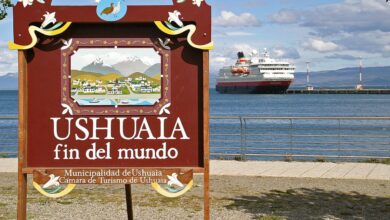STOP Cruises: Are they the Most Harmful Means of Transport for the Environment?
Cruise ships are returning to their pre-pandemic levels of activity. However, this renewed enthusiasm for sea holidays has severe effects on the environment. We will tell you why.

Photo: Unsplash
LatinAmerican Post | María Fernanda Ramírez Ramos
Escucha este artículo
Leer en español: STOP cruceros: ¿Son el medio de transporte más perjudicial para el medio ambiente?
One of the industries hardest hit by the pandemic was cruise ships, as travel was banned (for a while), and stocks plummeted. However, tourism is picking up again. According to data from the World Tourism Organization, UNWTO, "more than 900 million tourists traveled internationally in 2022, double the number registered in 2021, although it is still 63% of pre-pandemic levels." In this regard, America has resumed 65% of its tourist activity, and it is expected that in 2023 these figures will continue to increase.
Cruise ships are no stranger to this trend and are returning to their pre-pandemic activity levels. However, a vacation by the sea can have a very negative environmental impact. For this reason, environmental and citizen platforms are calling for the cruise industry to stop and for more regulations to be put in place for them. This has happened in places like Mexico, the Bahamas, Spain, and Italy.
What is the Environmental Impact of Cruises?
Air pollution: Cruise ships emit large amounts of exhaust gases, such as carbon dioxide, nitrogen oxides, and particulates. These emissions contribute to climate change. In addition, they affect the air quality in the port cities where they dock, affecting the population's health.
Water pollution: Cruise ships also generate large amounts of sewage, which can contain chemicals and materials toxic to marine ecosystems. The Ocean Conservancy says graywater discharges "can cause oxygen depletion, spread pathogenic bacteria and viruses." Cruise ship fuels or waters often contaminated with oil end up in the sea. In this sense, they threaten reefs and biodiversity in general. This results in untold harm to marine life.
Noise pollution and death of animals: The engines and activities on board cruise ships generate a lot of underwater noise that can affect animals. Likewise, there have been deaths of whales and other animals due to the activity of cruise ships.
Waste: These vessels generate enormous amounts of garbage. They are often poorly managed, and crafts have been fined for releasing waste into the sea. It is necessary to consider that these "floating cities" must carry food and other materials on board to sustain the travelers. This generates large amounts of plastic and food waste.
We suggest you read: PFAS, perpetual chemicals endanger endangered species
An exemplary case occurred with Princess Cruise Lines Ltd, a subsidiary of Carnival Corporation (the world's largest cruise company). In 2016, he received a criminal sanction for deliberate contamination by the Department of Justice. He had to pay a $40 million fine for illegally dumping waste into the sea, much of it containing oil.
Sustainability: The Biggest Challenge for Cruises and Maritime Tourism
"Cross-cutting sustainability considerations, such as the protection of the ecosystem, the reduction of pollution and plastic waste, the conservation of biodiversity, and investments in green technologies within the blue economy, must necessarily be integrated into the development of the tourism industry. Cruise ship and tourism in general," says Jamaica's Minister of Tourism, Edmund Bartlett, in an article for the Ocean Panel. The latter is a global initiative for sustainability in the maritime economy. And it is that countries like Jamaica and other island states in the Caribbean and the Pacific have a significant source of income in the tourism and cruise industry.
However, it is paradoxical since, at the same time, they are the countries most threatened by climate change. It is urgent to adopt measures to mitigate its impacts, such as using cleaner fuels and better waste management. Likewise, rethinking the form of mass tourism towards one that generates a more significant positive impact on local communities and does not negatively affect ecosystems should be prioritized. Thus, it is worth asking if the cruise industry, as it is now thought, is worth it in a world in crisis due to the climate emergency.
An Impact Beyond the Environment
In addition to the issue of sustainability, other factors have caused cities to start rejecting them on their shores. And they are huge ships, which can have between 3,000 and 6,800 passengers on average and weigh up to 90,000 tons. These substantial water hotels come to a city and allow these thousands of passengers to disembark for an express visit.
However, the presence of huge boats, in addition to affecting the ecosystems, has an impact on the landscape and the deterioration of the heritage of many places. An exemplary case is that of Venice, which since 2021, prohibited entry to its center for the largest vessels, that is, those of more than 21,000 tons. Likewise, this type of tourism only sometimes generates an economic benefit for local communities since people have everything included in the cruise or do not sleep in hotels.
Some sites, such as islands or areas with exceptional heritage, need to prepare for mass tourism. The presence of so many people affects the water, biodiversity, and the locals, by disturbing their lifestyle.





